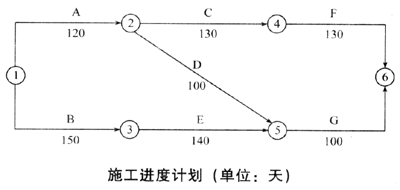某施工单位与建设单位按《建设工程施工合同(示范文本)》签订了固定总价施工承包合同,合同工期390天,合同总价5 000万元。合同中约定按建标[2003]206号文综合单价法计价程序计价,其中间接费费率为20%,规费费率为5%,取费基数为人工费与机械费之和。
施工前施工单位向工程师提交了施工组织设计和施工进度计划(见下图)。
该工程在施工过程中出现了如下事件。
事件1:因地质勘探报告不详,出现图纸中未标明的地下障碍物,处理该障碍物导致工作A持续时间延长10天,增加人工费2万元、材料费4万元、机械费3万元。
事件2:结构施工阶段因建设单位提出工程变更,导致施工单位增加人工费4万元、材料费6万元、机械费5万元、工作E持续时间延长30天。
事件3:因施工期间钢材涨价而增加材料费7万元。
针对上述事件,施工单位按程序提出了工期索赔和费用索赔。
事件2中,承包商可索赔材料费的情况是()。
A.人工价格上涨
B.材料超期储存
C.材料被盗和损坏
D.材料进货日期变化
参考答案:B
